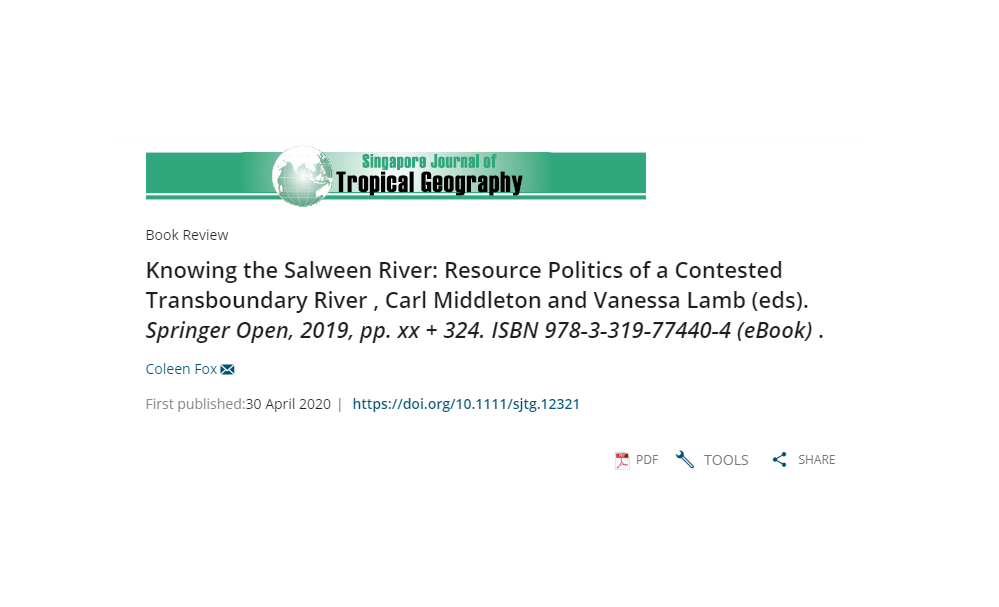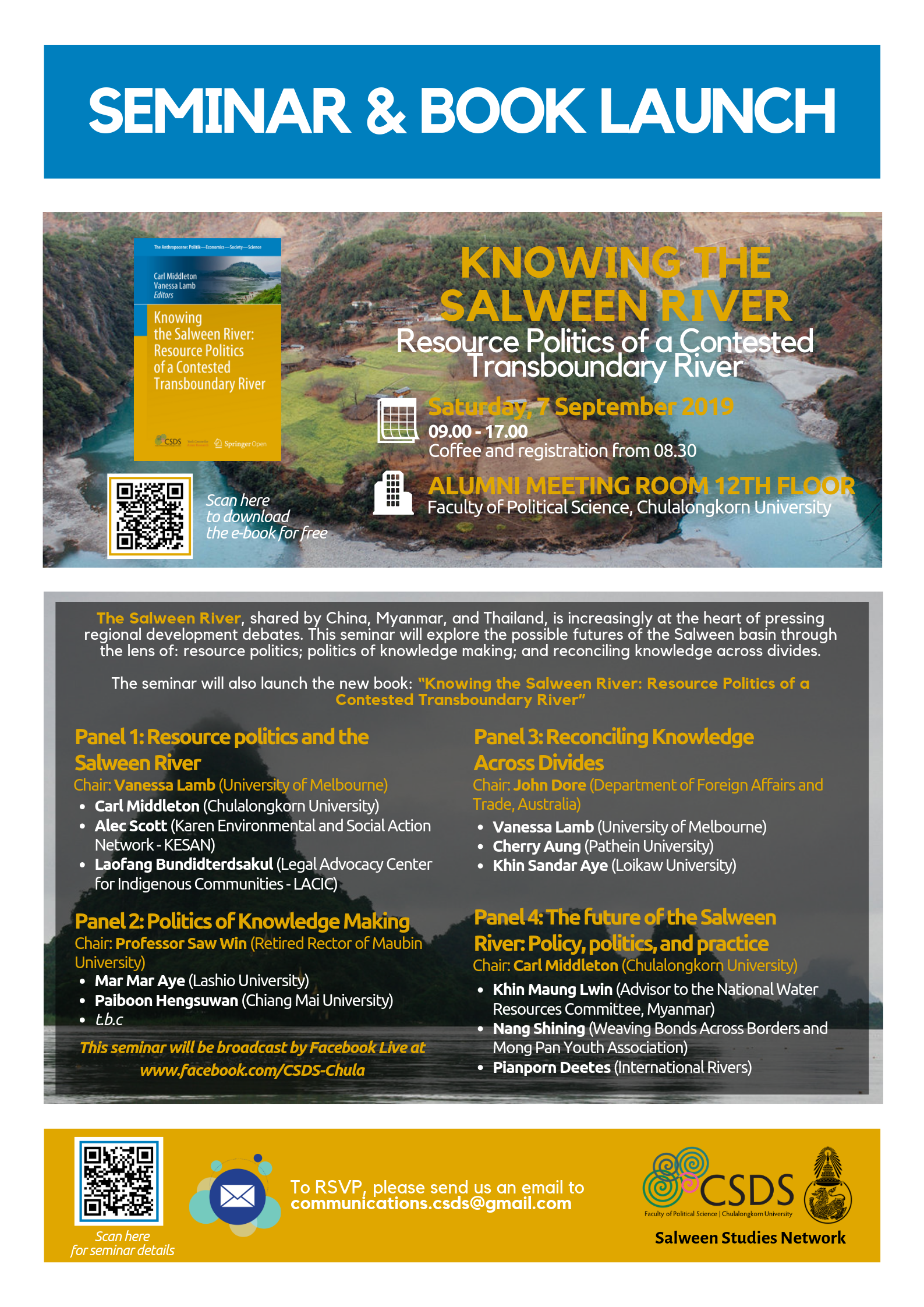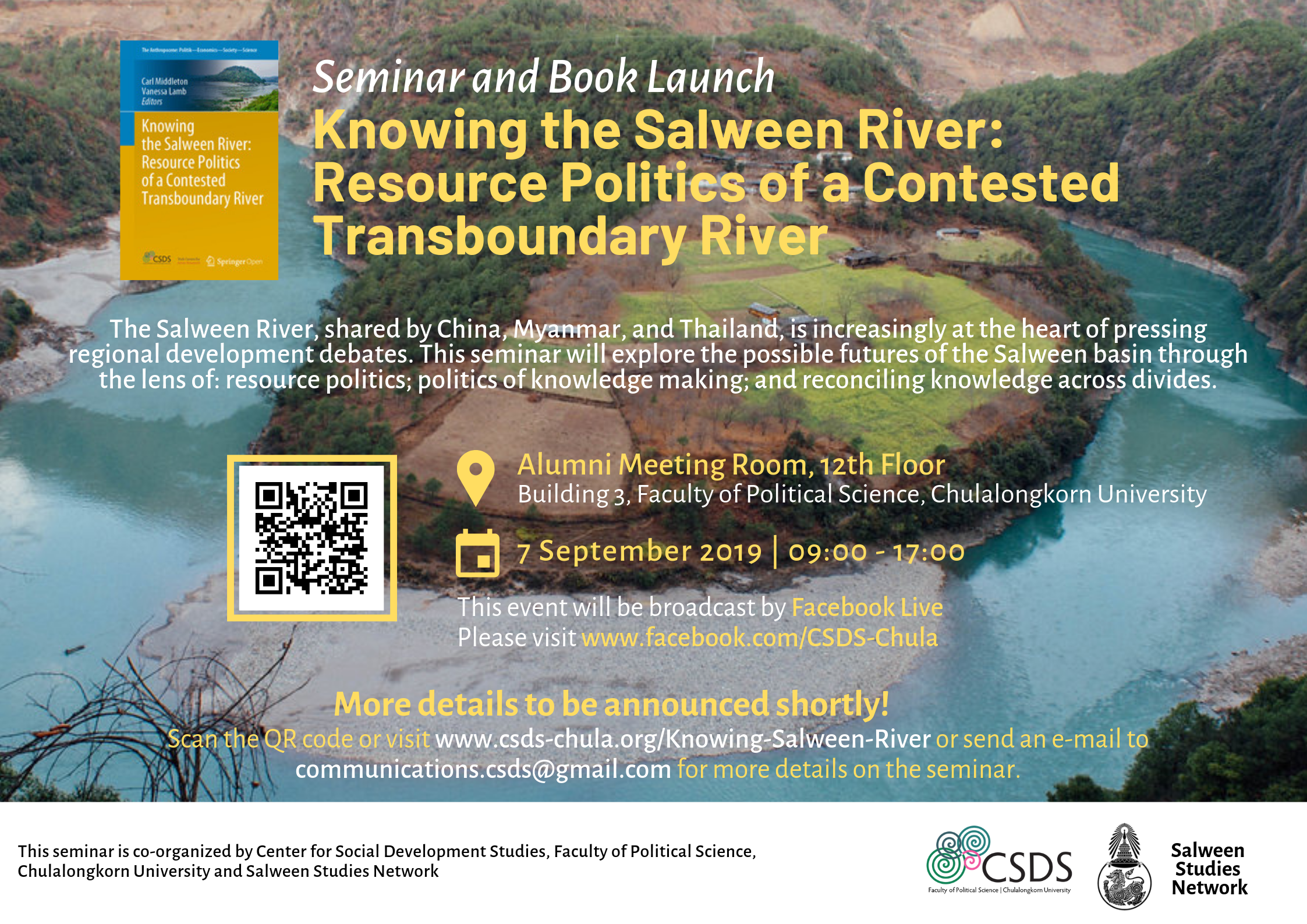Saturday, 7 September 2019, Alumni Meeting Room, 12th Floor, Kasem Utthayanin Building (อาคารเกษม อุทยานิน), Faculty of Political Science, Chulalongkorn University, Bangkok, Thailand (guide to the venue here)
Co-organized by Center for Social Development Studies (CSDS) and Salween Studies Network
The Salween River, shared by China, Myanmar, and Thailand, is increasingly at the heart of pressing regional development debates. The basin supports the livelihoods of over 10 million people, and within it there is great socioeconomic, cultural and political diversity. The basin is witnessing intensifying dynamics of resource extraction, alongside large dam construction, conservation and development intervention, that is unfolding within a complex terrain of local, national and transnational governance. With a focus on the contested politics of water and associated resources in the Salween basin, in this seminar we will explore the possible futures of the Salween basin through the lens of: resource politics; politics of knowledge making; and reconciling knowledge across divides. The seminar will also launch the new book: “Knowing the Salween River: Resource Politics of a Contested Transboundary River”.
Program and List of Panelists:
08.30 - 09.00 Registration
09.00 - 09.15 Welcome remarks
09.15 - 10.30 Panel 1: Resource politics and the Salween River
Chair: Vanessa Lamb, University of Melbourne
“From Hydropower Construction to National Park Creation: Changing Pathways of the Nu River” by Carl Middleton, Chulalongkorn University [with Chen Xiangxue]
“Hydropower Politics and Conflict on the Salween River” by Alec Scott, Karen Environmental and Social Action Network (KESAN) [with Carl Middleton and Vanessa Lamb]
“Local Context, National Law: The Rights of Karen People on the Salween River in Thailand“ by Laofang Bundidterdsakul, Legal Advocacy Center for Indigenous Communities (LACIC)
10.30 - 10.45 Coffee Break
10.45 - 12.00 Panel 2: Politics of knowledge making
Chair: Professor Saw Win, Retired Rector of Maubin University
“An Ethnobotanical Survey in Shan State, Myanmar: Where Thanlwin Biodiversity, Health, and Deforestation Meet” by Mar Mar Aye, Lashio University [with with Swe Swe Win]
‘'Not only Anti-dam: Simplistic Rendering of Complex Salween Communities in Their Negotiation for Development in Thailand” by Paiboon Hengsuwan, Chiang Mai University
“Opportunities and Challenges for Salween Water Governance: Lessons learned from Daw La Lake and Kaw Ku Island, Karen State” by Saw Tha Phoe
12.00 - 13.00 Lunch
13.00 - 13.15 Short film showing: “Salween Stories” with introduction by Carl Middleton
13.15 - 14.30 Panel 3: Reconciling knowledge across divides
Chair: John Dore, Department of Foreign Affairs and Trade, Australia
“A State of Knowledge of the Salween River: An Overview of Civil Society Research” by Vanessa Lamb, University of Melbourne [with Carl Middleton, Saw John Bright, Saw Tha Phoe, Naw Aye Aye Myaing, Nang Hom Kham, Sai Aum Khay, Nang Sam Paung Hom, Nang Aye Tin, Nang Shining, Yu Xiaogang, Chen Xiangxue and Chayan Vaddhanaphuti]
“Fisheries and Socio-economic Change in the Thanlwin River Estuary in Mon and Kayin State, Myanmar” by Cherry Aung, Pathein University
“The Impact of Land Cover Changes on Socio-economic Conditions in Bawlakhe District, Kayah State” by Khin Sandar Aye, Loikaw University [with Khin Khin Htay]
14.30 - 14.45 Coffee Break
14.45 - 16.00 Panel 4: The future of the Salween River: Policy, politics, and practice
Chair: Carl Middleton, Chulalongkorn University
“Positioning the Salween in Myanmar’s River Politics” by Khin Maung Lwin, Advisor to the National Water Resources Committee, Myanmar
“What’s Next for the River? Is the Thanlwin ‘Under Threat’ or ‘on the Thread’” by Nang Shining, Weaving Bonds Across Borders and Mong Pan Youth Association
“Salween as a Site for Transboundary Justice and Activism” by Pianporn Deetes, International Rivers
16.00 - 16.30 Book Launch and Concluding Remarks
This event will be broadcasted on Facebook Live: www.facebook.com/CSDSChula/
To register for this forum, please e-mail us your name, organisation, and position to Anisa Widyasari (CSDS) at communications.csds@gmail.com. The seat is limited and registration will be accepted on first come first served basis.
For the most updated information, you can also visit the event’s landing page here.










